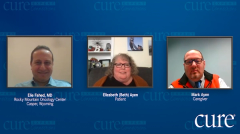
The Impact of Multiple Myeloma on Beth’s Quality of Life
Beth discusses the impact on quality of life caused by her second relapse of multiple myeloma, as well as shares her experience with subsequent treatment.
Episodes in this series

Elie Fahed, MD: Going back, we did one year of VCD, or cyclophosphamide, Velcade [bortezomib] and Decadron [dexamethasone]. Because of neuropathy, this was stopped; we took about a year off from treatment. We are now around November or December 2016. You started having symptoms again. What happened?
Elizabeth Ayen: Yeah, I started having pain again in different areas. It seemed as though when stuff came back, there were just lesions everywhere—several lesions, at least 3 or 4 in different places. We did more radiation, and then you guys decided that I needed to do some more systemic chemotherapy.
Elie Fahed, MD: What was your quality of life around that time? Do you remember?
Elizabeth Ayen: I was working as a teacher at about 55 hours a week. It was really hard because I started feeling not so great with a lot of pain. It was not really affecting other parts of my life; the pain was the most prevalent thing. I was feeling pretty well other than that.
Elie Fahed, MD: Mark, were you feeling that pain? Was that affecting your own life or your interactions? Were you frustrated?
Mark Ayen: The issue with Beth is that she has a really high pain tolerance. Many times, by the time I know she’s having problems, it has gotten quite bad. As you know, she does not like to take stuff for pain. She would rather just tough it out. That has always been the hardest thing for me, trying to explain to her, “You would feel a lot better if you would take something,” and she would say, “I don’t want to.” We would have those conversations, but as I said, I felt it because sometimes I could tell she was in pain. But she rarely complained about it, and when she did, at that point, it was usually quite bad.
Elie Fahed, MD: She is a tough lady, for sure. Whenever she’s complaining of pain, we know it is real and that we have to look quickly because she has a high pain tolerance. She tends to keep working and try to ignore herself. At that time, around November or December of 2016, a new combination was approved. A few months earlier, daratumumab—or Darzalex, a monoclonal antibody for anti-CD38 cells—was approved. It is a single agent, to be used after three lines of therapy. In November 2016, it was approved to be used in a combination with lenalidomide, also known as Revlimid, and Decadron [dexamethasone]. That is what we decided to go with. We went with a combination of Darzalex [daratumumab], Revlimid [lenalidomide] and Decadron [dexamethasone]. That is what we remember of that time.
Elizabeth Ayen: We were on that treatment for three years. It worked really well for a long time. I don’t remember a lot of side effects. Maybe I experienced some fatigue, and maybe I had some stomach issues. But as you said, the antinausea treatment is so much better, and the regimen that we can go through with the three different drugs really helped. I just started developing some cataracts during that time from the Revlimid [lenalidomide] and the dexamethasone, but it was not bad enough to require surgery at that point. Other than that, it was pretty easy. I was still working, and I did not have many side effects.
Elie Fahed, MD: The main side effects with Darzalex [daratumumab]—I am not sure you remember—with the first infusion, lots of patients would have reactions. I am not sure if it was you, Mark, but we sent someone to get some Singulair [montelukast] one day to give it to her before the infusion, and immediately it helped her.
Mark Ayen: That first day of the infusion was just terrifying. She was in the infusion room and the nurses gave her a bell. They said, “If your throat starts itching or you start blowing up in any place, ring this bell.” She did, but the bell was broken and we didn’t know it. I was yelling, “Hey, we need someone.” We had to keep some stuff down. They said, “We need you to run to the store, and we need you to get some Singulair [montelukast], just the box—get the pills over the counter and bring it back here.” I ran to the store quickly and brought them back, and that seemed to make all the difference.
Elie Fahed, MD: There was immediate relief. I remember she took the pill and then almost immediately she felt better.
Elizabeth Ayen: For sure.
Elie Fahed, MD: That time we learned a lesson. We now divide the first dose over two days. You were probably one of the first patients with this combination in our center.
Elizabeth Ayen: I think so.
Elie Fahed, MD: We divide the first dose over two days. Even better is that we have a subcutaneous formulation that we are able to give way faster. We do not have to do it over six to eight hours as we used to. It is a great combination; it controls your dizziness for about two to three years. You felt well. Do you remember any toxicity from the Revlimid [lenalidomide]?
Elizabeth Ayen: No, not at all.
Elie Fahed, MD: Not at all—so you had no cramps and no diarrhea? That can happen in some patients.
Elizabeth Ayen: Nope.
This transcript was edited for clarity.
